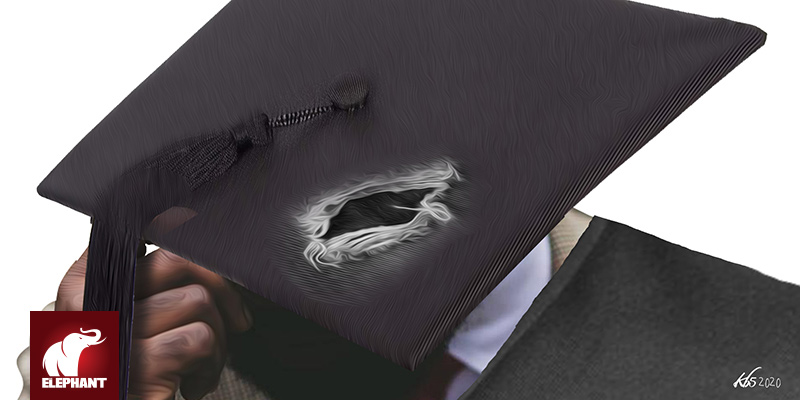For six years, from 2016 to 2021, I was Vice Chancellor (President) of a private university in Kenya, the United States International University-Africa. It was an honor and privilege to serve in that role. It marked the apex of my professional academic life. It offered an incredible opportunity to make my small contribution to the continued development of the university itself, put into practice my scholarly research on African higher education, and deepen my understanding of the challenges and opportunities facing the sector at a time of tumultuous change in African and global political economies.
When I took the position, I was quite familiar with both African universities and Kenya as a country. I was a product of African higher education having undertaken my undergraduate studies at the University of Malawi, my home country, in the 1970s. I had done my PhD dissertation at Dalhousie University in Canada on Kenya’s economic and labor history where I spent about fifteen months in 1979-1980.
Later, I taught at Kenyatta University in Nairobi for five and half years between 1984-1989. That is one reason the position of Vice Chancellor at USIU-Africa eventually proved attractive to me. I would be returning to my African “intellectual home.” Or so I thought. I came back to a different country, as I will elaborate later in my reflections.
After I left Kenya at the beginning of January 1990, I spent the next 25 years at Canadian and American universities. But Africa was always on my mind, as an epistemic and existential reality, the focus of my intellectual and political passions, the locus of my research work and creative writing. My scholarly studies on intellectual history examined the construction of ideas, disciplines, interdisciplines, and higher education institutions and their African provenance, iterations, and inflections.
Over the years I had published numerous books and papers on African studies and universities including in 2004 African Universities in the 21st Century (Vol.I: Liberalization and Internationalization and Vol II: Knowledge and Society), and in 2007 The Study of Africa (Vol. I: Disciplinary and Interdisciplinary Encounters and Vol.II: Global and Transnational Engagements).
In early 2015, I was commissioned to write the Framing Paper for the 1st African Higher Education Summit on Revitalizing Higher Education for Africa’s Future held in Dakar, Senegal March 10-12. I was also one of the drafters of the Summit Declaration and Action Plan. So, I was well versed on the key issues facing African higher education. But leading an actual African university proved a lot more complex and demanding as this series will show.
The vice chancellor’s position at USIU-Africa was advertised after the Dakar Summit. Initially, it had little appeal for me. My earlier experiences at Kenyatta University had left me wary of working as an “expatriate”, as a foreigner, in an African country other than my own. In fact, in 1990 I wrote a paper on the subject, “The Lightness of Being an Expatriate African Scholar,” which was delivered at the renowned conference convened by the Council for the Development of Social Science Research in Africa, held in Uganda in late November 1990, out of which emerged the landmark Kampala Declaration on Intellectual Freedom and Social Responsibility. The paper was included in my essay collection, Manufacturing African Studies and Crises published in 1997.
The paper began by noting, “The lack of academic freedom in Africa is often blamed on the state. Although the role of the state cannot be doubted, the institutions dominated by the intellectuals themselves are also quite authoritarian and tend to undermine the practices and pursuit of academic freedom. Thus, the intellectual communities in Africa and abroad, cannot be entirely absolved from responsibility for generating many of the restrictive practices and processes that presently characterize the social production of knowledge in, and on, Africa. In many instances they have internalized the coercive anti-intellectualist norms of the state, be it those of the developmentalist state in the South or the imperialist state in the North, and they articulate the chauvinisms and tyrannies of civil society, whether of ethnicity, class, gender or race.”
The rest of the paper delineated, drawing from my experiences at Kenyatta, the conditions, contradictions, constraints, exclusions, and marginalization of African expatriate scholars in African countries that often force them to trek back to the global North where many of them studied or migrated from, as I did.
Once I returned from the diaspora back to Kenya in 2016, I soon realized, to my consternation, that xenophobia had actually gotten worse, as I will discuss in later sections. It even infected USIU-Africa that took pride in being an “international American university.” In my diasporic excitement to “give back” to the continent, to escape the daily assaults of racism that people of African descent are often subjected to in North America, Europe and elsewhere, I had invested restorative Pan-African intellectual and imaginative energies in a rising developmental, democratic, integrated and inclusive post-nationalist Africa.
Over the next six years, I clang desperately to this fraying ideal. It became emotionally draining, but intellectually clarifying and enriching. I became an Afro-realist, eschewing the debilitating Afro-pessimism of Africa’s eternal foes and the exultant bullishness of Afro-optimists.
In 2015, as I talked to the VC search firm based in the United States, and some of my close friends, and colleagues in the diaspora I warned up to the idea of diaspora return. The colleagues included those who participated in the Carnegie African Diaspora Fellowship Program (CADFP). The program was based on research I conducted in 2011-2012 for the Carnegie Corporation of New York (CCNY) on the engagement of African diaspora academics in Canada and the United with African higher education institutions.
CADFP was launched in 2013 and I became chair of its Advisory Council comprised of prominent African academics and administrators. This was one of four organs of the program; the other three were CCNY providing funding, the Institute for International Education (IIE) offering management support, and my two former universities in the US (Quinnipiac) and Kenya (USIU-Africa) hosting the Secretariat. Several recipients ended up returning to work back on the continent long after their fellowships. I said to myself, why not me?
For various reasons, my position as Vice President for Academic Affairs in Connecticut had turned out to be far less satisfactory than I had anticipated. I was ready for a new environment, challenges, and opportunities. So, I put in an application for the USIU-Africa vice chancellorship. There were 65 candidates altogether. The multi-stage search process replicated the ones I was familiar with in the US, but it was novel in Kenya where the appointment of vice chancellors tends to be truncated to an interview lasting over a couple of hours or so in which committee members score the candidates sometimes on dubious ethnic grounds.
At the time I got the offer from USIU-Africa, I had two other offers, a provostship in Maryland, and as founding CEO of the African Research Universities Alliance. Furthermore, I was one of the last two candidates for a senior position at one of the world’s largest foundations from which I withdrew. I chose USIU-Africa after long deliberations with my wife and closest friends. Becoming vice chancellor would give me an opportunity to test, implement, and refine my ideas on the Pan-African project of revitalizing African universities for the continent’s sustainable transformation.
USIU-Africa had its own attractions as the oldest private secular university in Kenya. Originally established in 1969 as a branch campus of an American university by that name based in San Diego that had other branches in London, Tokyo, and Mexico City, it was the only university in the region that enjoyed dual accreditation by the Commission for University Education in Kenya and the Western Association of Schools and Colleges in the United States. Moreover, it was the most international university in the region with students from more than 70 countries; an institution that seemed to take diversity and inclusion seriously; a comprehensive university with several schools offering bachelor’s, master’s, and doctoral programs; one that boasted seemingly well-maintained physical and electronic infrastructure poised for expansion. The position prospectus proclaimed the university’s ambitions to become research intensive.
Six months before my wife and I packed our bags for Kenya, I took up a fellowship at Harvard University to work on a book titled, The Transformation of Global Higher Education: 1945-2015 that was published in late 2016. I had long been fascinated by the history of ideas and knowledge producing institutions around the world, and this book gave me an opportunity to do so, to examine the development of universities and knowledge systems on every continent—the Americas, Europe, Asia, and of course Africa. Writing the book filled me with excitement bordering on exhilaration, not least because it marked the second time in my academic career that I was on sabbatical.
I thought I was as prepared as I could be to assume leadership of a private African university. As I showed in my book, by 2015, private universities outnumbered public ones across the continent, 972 out of 1639. In 1999, there were only 339 private universities. Still, public universities predominated in student enrollments, and although many had lost their former glory, they were often much better than most of the fly by night profiteering private institutions sprouting all over the place like wild mushrooms.
Africa of course needed more universities to overcome its abysmally low tertiary enrollment ratios, but the haphazard expansion taking place often without proper planning and the investment of adequate physical, financial, and human resources only succeeded in gravely undermining the quality of university education. The quality of faculty and research fell precipitously in many countries and campuses as I have demonstrated in numerous papers.
Serving in successive administrative positions ranging from college principal and acting director of the international program at Trent University in Canada, and in the United States as center director and department chair at the University of Illinois, college dean at Loyola Marymount University, and academic vice president at Quinnipiac University, I had come to appreciate that once you enter the administrative ladder, even if it’s by accident or reluctantly as was in my case, there are some imperatives one has to undertake in preparing for the next level.
Universities are learning institutions and as such university leaders at all levels from department chairs to school deans to management to board members must be continuous learners. This requires an inquisitive, humble, agile, open, creative, entrepreneurial, and resilient mindset.
It entails, first, undergoing formal training in university leadership. Unfortunately, this is underdeveloped in much of Africa as higher education leadership programs hardly exist in most countries. As part of my appointment, I asked for professional training opportunities to be included in my contract for the simple reason I had never been VC before so I needed to learn how to be one! In summer 2016 and summer 2017, I attended Harvard University’s seminars, one for new presidents and another on advancement leadership for presidents. Not only did I learn a lot, I also built an invaluable network of presidential colleagues.
Second, university leaders must familiarize themselves with and understand trends in higher education by reading widely on developments in the sector. In my case, for two decades I became immersed in the higher education media by subscribing to The Chronicle of Higher Education and later Times Higher Education, and reading the editions of Inside Higher Education, University World News, and other outlets. As vice chancellor I took to producing a weekly digest of summaries of pertinent articles for the university’s leadership teams. I got the impression few bothered to read them, so after a while I stopped doing it. I delved into the academic media because I wanted to better understand my role and responsibilities as an administrator. Over time, this morphed into an abiding fascination with the history of universities and other knowledge producing institutions and systems.
Third, it is essential to develop the propensity for consulting, connecting, and learning from fellow leaders within and outside one’s institution. As a director, chair or a dean that means colleagues in those positions as well as those to who one reports. The same is true for deputy vice chancellors or vice presidents. For provosts and executive vice presidents and presidents the circle for collegial and candid conversations and advice narrows considerably and pivots to external peers.
In my case, this was immensely facilitated by joining boards including those of the International Association of Universities, the Kenya Education Network, better known as KENET, and the University of Ghana Council, and maintaining contacts with Universities South Africa. These networks together with those from my previous positions in Canada and the United States proved invaluable in sustaining my administrative and intellectual sanity.
Fourth, it is imperative to develop a deep appreciation and respect for the values of shared governance. Embracing and practicing shared governance is hard enough among the university’s internal stakeholders comprising administrators, faculty, staff, and students. It’s even more challenging for the external stakeholders including members of governing boards external to the academy. This was one of the biggest challenges I faced at USIU-Africa as I’ll discuss in a later installment.
Fifth, it is critical to appreciate the extraordinary demands, frustrations, opportunities and joys of leadership in African universities. Precisely because many of these universities are relatively new and suffer from severe capacity challenges of resources in terms of funding, facilities, qualified faculty, and well-prepared students, it creates exceptional opportunities for change and impact. Again, as will be elaborated in a later section, I derived levels of satisfaction as vice chancellor that were higher than I had experienced from previous positions in much older and better endowed Canadian and American institutions where university leaders are often caretakers of well-oiled institutional machines.
Sixth, during my long years of university leadership at various levels I had cultivated what I call the 6Ps: passion for the job, people engagement, planning for complexity and uncertainty, peer learning, process adherence, and partnership building. This often encompasses developing a personal philosophy of leadership. As I shared during the interviews for the position and throughout my tenure, I was committed to what I had crystallized into the 3Cs: collaboration, communication and creativity, in pursuit of the 3Es: excellence, engagement, and efficiency, based on the 3Ts: transparency, trust, and trends.
Seventh, it is important to pursue what my wonderful colleague, Ruthie Rono, who served as Deputy Vice Chancellor during my tenure, characterized as the 3Ps: protect, promote, and project, in this case, the mission, values, priorities, and interests of the institution as a whole not sectarian agendas. She often reminded us that this was her role as Kenya’s ambassador to several European and Southern African countries during a leave of absence from USIU-Africa, to safeguard Kenya’s interests. Unfortunately, outside the management team, this was not always the case among the other governing bodies as will be demonstrated later.
Eighth, as an administrator one has to balance personal and institutional voices, develop an ability to forgive and forget, and realize that it’s often not about you, but the position. Of course, so long as you occupy the position what you do matters; you take credit and blame for everything that happens in the institution even if you had little to do with it. Over the years as I climbed the escalator of academic administration, I confronted the ever-rising demands and circuits of institutional responsibility and accountability. You need to develop a thick skin to deflect the arrows of personal attack without absorbing them into your emotions. You need to anticipate and manage the predictable unpredictability of events.
Ninth, I had long learned the need to establish work balance as a teacher, scholar, and administrator. In this case, as an administrator I taught and conducted research within the time constraints of whatever position I held. I did the same during my time as vice chancellor. I taught one undergraduate class a year, attended academic conferences, and published research papers to the surprise of some faculty and staff and my fellow vice chancellors. I always reminded people that I became an academic because I was passionate about teaching and research. Being an administrator had actually opened new avenues for pursuing those passions. I had a satisfying professional life before becoming vice chancellor and I would have another after I left.
There was also the question of work-life balance. Throughout my administrative career I’ve always tried to balance as best as I can my roles as a parent, husband, friend, and colleague. Moreover, I maintained outside interests especially my love for travel, the creative, performing and visual arts, voracious reading habits developed in my youth over a wide range of subjects and genres, not to mention the esthetics of cooking and joys of eating out, and taking long walks. I found my neighborhood in Runda in Nairobi quite auspicious for the invigorating physical and mental pleasures of walking, which I did every day for more than an hour during weekdays and up to two hours on weekends.
Not being defined by my position made it easier to strive to perform to the best of any ability without being consumed by the job, and becoming overly protective of the fleeting seductions of the title of vice chancellor. I asked colleagues to call me by my first name, but save for one or two they balked preferring the colorless concoction, “Prof.” Over the years I had acquired a capacity to immerse myself and enjoy whatever position I occupied with the analytical predisposition of an institutional ethnographer. So, I took even unpleasant events and nasty surprises as learning and teachable moments.
This enabled me to develop the tenth lesson. Leave the position when you’ve given your best and have the energy to follow other positions or pursuits. When I informed the Board of Trustees, Chancellor, and University Council fourteen months to the end of my six-year contract that I would be leaving at the end of the contract, some people within and outside USIU-Africa including my fellow vice chancellors expressed surprise that I was not interested in another term.
The fact of the matter is that the average tenure of university presidents in many countries is getting shorter. This is certainly true in the United States. According to a 2017 report on the college presidency by the American Council of Education, while in the past presidents used to serve for decades—my predecessor served for 21 years—“The average tenure of a college president in their current job was 6.5 years in 2016, down from seven years in 2011. It was 8.5 years in 2006. More than half of presidents, 54 percent, said they planned to leave their current presidency in five years or sooner. But just 24 percent said their institution had a presidential succession plan.” Whatever the merits of longevity, creativity and fresh thinking is not one of them!
A major reason for the declining term of American university presidencies is, as William H. McRaven, a former military commander who planned the raid that killed Osama bin Laden, declared as he announced his departure as chancellor of the University of Texas system after only three years, “the job of college president, along with the leader of a health institution, [is] ‘the toughest job in the nation.’ In my case, there was a more mundane and compelling reason. My wife and I had agreed before I accepted the position that I would serve only one term. Taking the vice chancellorship represented a huge professional and financial sacrifice for her.
By the time I assumed the position, I believed I had acquired the necessary experiences, skills and mindset for the pinnacle of university leadership. Over the next six years I experienced the joys and tribulations of the job in dizzying abundance. This was evident almost immediately.
Two days after we arrived in Nairobi, we were invited to the home of one of my former students at Kenyatta University and the University of Illinois. Both he and his wife, who we knew in the United States from the days they were dating, were prominent public figures in Kenya; she later became a cabinet minister in President Kenyatta’s administration. We spent New Year’s Day at their beautiful home together with their lovely and exceedingly smart two daughters and some of their friends and relatives eating great food including roasted meat in Kenyan style. It was a fabulous welcome. We felt at home.
But the bubble soon burst. Hardly two weeks later, our home in the tony neighborhood of Runda was invaded by armed thugs one night. I was out of town at a university leadership retreat. My wife was alone. While she was not physically molested, she was psychologically traumatized. So was I. The thugs went off with all her jewelry including her wedding ring, my clothes and shoes, and our cellphones and computers. My soon to be finished book manuscript on The Transformation of Global Higher Education was in my stolen computer. It was a heinous intellectual assault.
Our Kenyan and foreign friends and acquaintances showered us with sympathy and support. Some commiserated with us by sharing their own stories of armed robbery, what the media called with evident exasperation, Nairoberry. We later learnt there was more to our hideous encounter, the specter of criminal xenophobia. It was a rude awakening to the roller coaster of highs and lows we would experience over the next six years during my tenure as Vice Chancellor of USIU-Africa.
Both of us had fought too many personal, professional, and political battles in our respective pasts to be intimidated. We were determined to stay, to contribute in whatever way we could to higher education in our beloved motherland.








